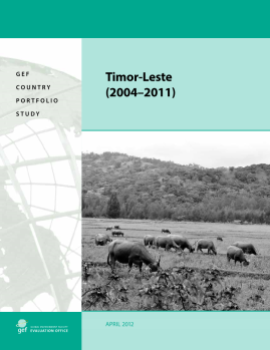The Democratic Republic of Timor-Leste (hereafter Timor-Leste) has been receiving GEF funding since 2002 after gaining independence. So far, GEF funding has totaled $7.9m and projects have been exclusively implemented by UNDP. This evaluation was conducted in parallel with the UNDP Assessment of Development Results for Timor-Leste (2003-2010). GEF funded activities are predominantly in the Climate Change focal area, but activities have also been undertaken in the Biodiversity and Land Degradation focal areas. Only one International Waters project has currently started but another is due to start soon. So far the focus has been on enabling activities and foundational capacity building. All completed projects are under the half-million dollar level but this is set to change.
Conclusions
- GEF support has assisted with developing foundational capacities, raising the profile of environmental issues, and establishing national priorities notably in Biodiversity and Climate Change.
- GEF support has been relevant to the Constitution and Strategic Development Plan and priorities as well as the country's efforts to fulfill its obligations under international agreements.
- Weak capacity is a problem affecting GEF projects.
- In Biodiversity, the GEF has supported the development of the National Biodiversity Strategies and Action Plans (NBSAP) which achieved its key outputs.
- Activities related to International Waters are of significant importance to Timor-Leste. GEF has supported both the SDS-SEA and ATSEA initiatives which are putting in place frameworks, developing policy and defining investment priorities.
- In Climate Change, the GEF has so far provided support to the development of the NAPA which achieved its key outputs, and also the NCSA. Adaptation has been the main focus of activities.
- In Land Degradation and promoting Sustainable Land Management, which is perhaps the country's most important environmental challenge, the GEF funded SLM project produced some useful outputs including the GIS mapping/database, and a training manual. However the project was hampered by a lack of financial and human resources. Further, the lack of a demonstration approach involving local communities to address slash and burn was a missed opportunity.
Lessons
- The GEF project approach is challenging for Timor-Leste consider its transition out of fragility; a longer-term approach may improve things.
- Linking livelihoods to environmental management is key to the development of the GEF portfolio. Please see the full list of conclusions and lessons in Chapter One of the Report.
